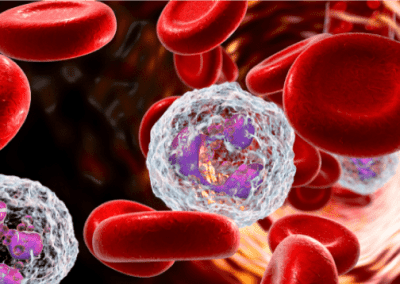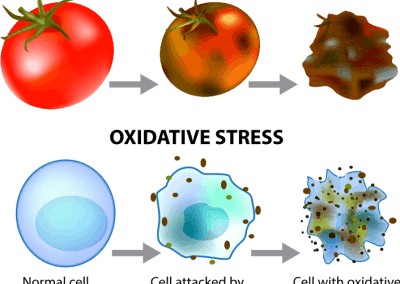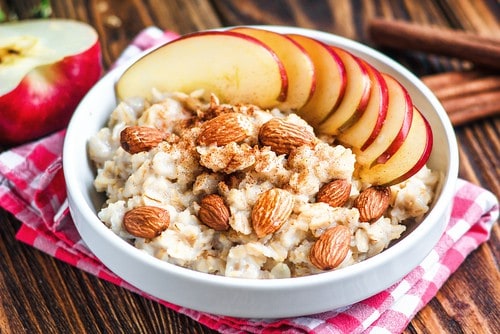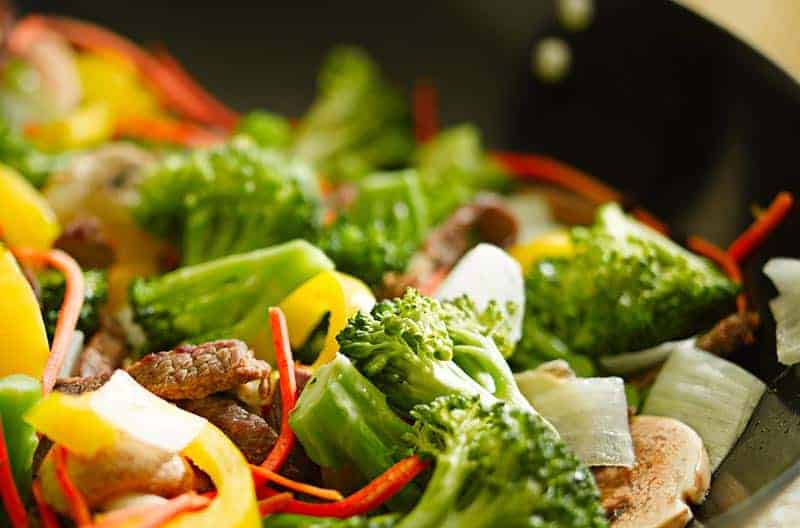A few years ago, curiosity led me to get my genetic profile done. So, I spat into a plastic tube and send it off to 23andMe, a direct-to-consumer genetic testing company in California. I was eager to learn what my genetics would reveal about my health.
23andMe tests about 700,000 SNPs (minor spelling variations) in a person’s genome, many of which are linked with known, inherited traits. That may sound like a lot, but it’s only 0.01 percent of the 6 billion DNA letters in the human genome. Research into genetics is still relatively new, meaning there are some limitations. Personally, I have found the information incredibly insightful, not only for me but also for my clients.
Below I reveal some of the most fascinating things I have learned about myself through genetic testing.

1. I’m virtually insensitive to caffeine!
We inherit two copies of the caffeine gene, one from each parent. If you have the fast variant, your liver breaks down caffeine quickly and efficiently and you feel less effects from caffeine. On the other hand if you have one or two of the slow variants of this gene, your body processes caffeine slowly meaning and you feel the effects of caffeine longer and harder. Here’s the breakdown:
- Fast metabolisers (40% of people) can tolerate coffee, tea and energy drinks like a boss. They break down caffeine four times faster than those who have one or two of the slow variants of this gene. This is me!
- Normal metabolisers (45% of people) have one fast copy and one slow copy. These people are not rapid clearers, nor do they feel the effects as easily or for as long as slow metabolisers. They are considered middle of the road metabolisers of caffeine.
- Slow metabolisers (15% of people) – have two copies of the slow variant meaning caffeine is broken down more slowly. These people feel the effects of caffeine longer and stronger.
I always wondered how I was able to have caffeine so close to bedtime and still sleep… now I know why !


2. I can digest lactose
I don’t really like milk, but at least I know I can digest it (and other lactose containing foods like cheese – thank goodness!). There are two genes that effect our ability to produce lactase into adulthood. Lactase is the enzyme that breaks down the sugar (lactose) in milk and other dairy products. I inherited one copy of each of these genes from each parent meaning I can digest lactose.
Interestingly, only 30% of people are actually lactose TOLERANT, meaning they retain the ability to produce lactase after weaning. It is much more common to be lactose INTOLERANT, as most humans naturally lose the ability to digest milk after weaning. The ability to continue to produce lactase in adulthood is a relatively recent genetic mutation and is a huge evolutionary advantage to those who have inherited it.
On the other hand, if like 70% of the population, you are lactose intolerant it may be best to avoid or limit lactose. This is because undigested lactose is fermented by bacteria in the colon, producing gas and causing unpleasant gut symptoms. Too much can also lead to overactivity of the immune system putting you at risk of autoimmune disease.
3. I am gluten intolerant
Bummer. Well, at least I can eat cheese!
Gluten is a large protein complex found in wheat, rye, spelt, barley and oats. For those who are genetically intolerant to gluten, our body perceives gluten as a threat to the immune system and causes an inflammatory response.
Knowing whether you are gluten intolerant is actually really important because if you continue to eat gluten when you are intolerant, you put yourself at risk of immune overactivity, inflammation and increased risk of autoimmune disease.
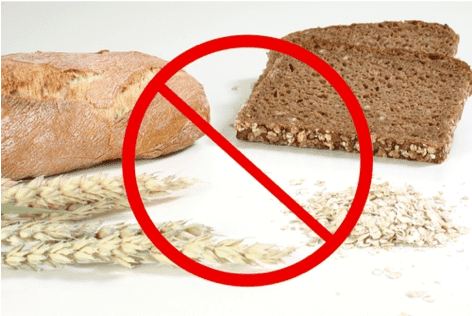
4. My Ancestry and Neanderthal DNA (23andMe)
I’m 98.9% European
One of the coolest things about doing genetic testing through 23andMe is learning about your ancestry. I learnt I am 72.9% British and Irish. No huge surprises there. However I was surprised to see some Scandinavian(5%), French and German (7.3%) heritage. You can also find DNA relatives using 23and me, although I haven’t looked into that yet.

I have more Neanderthal DNA than most people!
Neanderthals were ancient humans who interbred with modern humans before becoming extinct 40,000 years ago. 23andMe can tell you how much of your ancestry can be traced back to the Neanderthals. Apparently the average Caucasian has 2.5% Neanderthal DNA, and I have more than most, somewhere between 2.5-4%. This puts me in the 97th percentile! I’m not sure that’s necessarily a good thing, but it certainly is interesting nonetheless!


5. I need to supplement with Vitamin D
Although I can make vitamin D from the sun, my body has problems converting it to the active form in the liver and kidneys. In addition, my vitamin D receptor is faulty. This means vitamin D may struggle to exert its effects on target cells such as bone, immune, skin, nervous, endothelial and hair follicle cells.
This means I will need to watch my vitamin D levels and may need higher rates of supplementation in order to maintain healthy blood levels. Sulforaphane (contained in broccoli sprouts) is also recommended for me, as it will help my receptors to let more vitamin D into the cells.
I typically have low blood levels of Vitamin D, even when I supplement, so this result explains a lot.
6. I’m prone to anxiety and more sensitive to pain but I have a great memory
The COMT enzyme clears adrenaline, noradrenaline, dopamine and catechol oestrogen from the body and therefore plays an important role in mental health. COMT enzyme activity can be overactive or under-active, and both impact mental health.
I have a double variation (the worst kind) meaning I have 75% decreased enzyme activity. The double variant is associated with anxiety, lower bone mass and increased risk of fracture amongst other things. It’s not all bad though, the double gene is also associated with better memory and ability to focus on attention-based tasks. When under stress however, my memory performance may not be as good.
This explains while I’ve always been great at studying and doing assignments (focused based task) but not always great at exams i.e testing under pressure!


7. I’m best at power, sprint-based exercise
According to my genes, I have an increased risk of vasoconstriction (tightening of the blood vessels) and an increased risk of high blood pressure. As a result, I am much better at short bursts of exercise and power based workouts, then long distance, endurance exercises. Those people without these variations tend to prefer long distance and endurance type exercise as their blood vessels dilate much better.
This is true for me – I was always more of a sprinter at school and hated long distance running. My blood pressure is currently fine, but something I may need to conscious of (along with my salt intake)
8. I have increased risk for cardiovascular disease
Learning that many of my genes put me at increased risk for cardiovascular disease and atherosclerosis (clogged arteries), came as no big surprise. My family has a history of heart disease, with my maternal grandfather having passed away at the age of 64, following a long history of heart problems. My Mum, who is generally quite healthy, was recently diagnosed with mild coronary artery disease at age 60.
Although these findings are not “awesome” , I included some of my not-so-great results in order to make an important point – your genes are not your destiny. We know genetics are just one piece of the puzzle and can be affected by diet, lifestyle and the environment around us.
So even though this is not necessarily great news for me, I am glad I know now (in my 30’s) so I can be proactive about looking after my heart health.
If you are worried that you might learn something negative with genetic testing, I encourage you to remember that knowledge is power. There are things you can do (diet, lifestyle, nutrition, supplementation etc) to help overcome genetic weaknesses. While your genes don’t change, it is possible to change how they impact your life.

9. I may have increased risk of chronic inflammation and cell damage
More not-so-great news. While inflammation is a natural body defence mechanism to help the body repair from infections and tissue injury, the response needs to be well regulated and controlled. Chronic inflammation is associated with many modern-day chronic diseases such as CVD, atherosclerosis, diabetes, periodontal disease and many autoimmune diseases.
There are many different genes that effect and control the inflammatory response mechanism. Overall my genes put me at increased risk of chronic inflammation.
In addition, my genes also put me at higher risk for oxidative stress. This means my body’s internal cell defence mechanisms that fight free radicals may be poor. Oxidative stress leads to ageing, and underlies all disease processes including CVD, dementia, diabetes and premature ageing. It also plays a role in the development of cancer.
As with the news about my heart health, I choose to see this knowledge as a blessing rather than a curse. Interventions I can put in place now include upping the antioxidants I get from my diet (think lots of colourful fruits and vegetables). I can also supplement with specific products that help my body to make its own antioxidants, which are far more powerful than dietary antioxidants. Reducing my exposure to free radicals and toxins will also help, as will reducing inflammation. Currently my blood markers of inflammation are low, but this is something I will want to monitor.

10. I don’t have the “fat” gene, so luckily so I am not at increased risk of obesity
The FTO gene or “fat gene” is strongly associated with obesity and weight problems in childhood. Those with the variant gene have an increased risk of being overweight and obese, less control over eating, decreased satiety and selection of higher fat foods.
While I don’t have the “fat” gene, my genes do indicate I have a strong appetite and eat more when stressed or tired (which is true). I’ve always been naturally skinny with a healthy appetite and fast metabolism, so these results go some way to explaining why.
If you do have this gene though, it’s important to remember your genes are not your destiny. Knowing your genetics, so you can put the right interventions in place, is what’s important. For example fasting is not the best dietary intervention for those with the FTO gene however exercise will be key, as research shows it trumps the FTO gene.
Final thoughts
Genetic testing can be fascinating, but also scary for some. Personally, I find it empowering. I think it is the missing piece of the puzzle when it comes to health. Yes, we still have more to learn in this area, but I think genetic testing can provide some great insights into our health.
More importantly, your health practitioner can use your genetic profile to personalise and prioritise treatment for you. Genetic testing takes a lot of the guess work out of determining the optimum diet, lifestyle and health interventions for you.
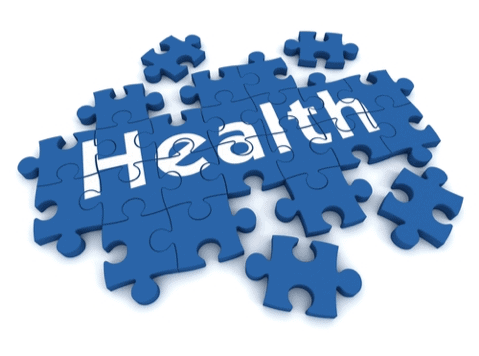
Interested to learn more? I can help
After gaining valuable insights into my own health through genetic testing, I decided I didn’t want to practice as a naturopath without being qualified in genetics and being able to offer this service to my clients. Therefore this year, I became an accredited Fitgenes practitioner.
Fitgenes provide a full DNA testing and interpretation service and offer a number of key health reports including:
- Health and Wellbeing Report
- Food Choice – intolerance and sensitivities ; and
- Carb Choice -how you body tolerates and metabolises starch carbs.
I am also qualified to order genetic reports from other reputable genetic testing companies.


Book now and start the journey to personalised health
If you’re keen to get started, book an appointment and we can get the process underway by discussing your health concerns, interests and goals. If you already have your 23andMe raw data and want help getting it interpreted, I can help with that too.
Alternatively, feel free to book a free 15 minute phone consultation (using the link above) and we can chat to see if genetic testing is right for you.


